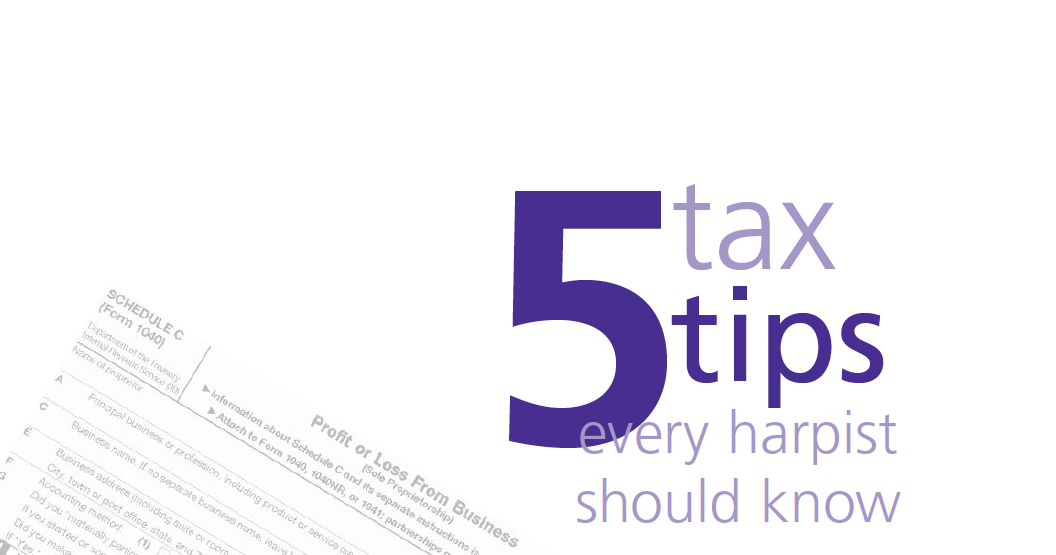Expense it
No one wants to pay Uncle Sam more than they have to. Scroll down for a list of business expenses that you may be able to deduct on your Schedule C when filing your U.S. income tax return.
The deadline for filing your 2015 U.S. income tax return is approaching quickly. Now is a good time to review your business expenses and make sure you are taking advantage of every legitimate deduction Uncle Sam allows.
If you teach at a school or play for an orchestra, you will receive a W-2 form to report your wages. If you freelance, or earn income from playing in addition to your W-2 wages, you are probably going to file a Schedule C. An important part of the Schedule C form is the business expenses you can claim to reduce your tax burden. Here is a list of the top five categories of expenses to examine before you file your return.
1 car expenses
Most harpists need a car to move their harp, and many car-related expenses are tax deductible, depending on how much the car is used for business. Maria Novotny, a partner in the accounting firm McDirmit Davis in Orlando, Fla., explains, “You may deduct actual expenses or take the standard mileage deduction, but not both.”
Standard mileage method: For 2015, the standard mileage rate is 57.5 cents per mile. That rate takes into consideration most of the operating costs for your vehicle, such as depreciation, gas, oil, insurance, repairs, etc. If you use the standard mileage method of expensing, you may also deduct tolls and parking fees.
Actual expense method: With this method, you can deduct all the expenses of operating the vehicle during the year to the extent the car was used for business. This includes depreciation, gas, lease payments, insurance, repairs, etc. You must maintain records and be able to produce receipts for all these expenses in the event of an audit.
Your tax professional will be able to determine which method is better for you, as it depends on a number of factors, such as whether you have more than one car at your disposal, the age of the car, whether the vehicle is used strictly for business and never for personal use, and even things like how many miles to the gallon your car gets. No matter which method you choose, you will still have to keep detailed records of your mileage including the date, mileage, business destination, and business purpose.
2 charitable contributions
There is a widely held misconception that you may take a deduction for services you offered for free. Unfortunately, this is not true. If you perform for a charity fundraiser for free, you may not take a deduction for what you would have charged even if the charity provides a receipt for your services. The IRS is very clear on this rule. IRS Publication 526, Charitable Contributions, page 6, item 4 under “Contributions You Cannot Deduct” states “You cannot deduct as a charitable contribution…the value of your time or services.”
You may be able to deduct an “in-kind” contribution, but this refers to property such as a harp or a computer. For example, if you purchase a harp and donate it to a school, that would qualify as an “in-kind” donation. However, you cannot donate a harp that you have already depreciated and take another deduction for the harp. If you have already written the harp off or fully depreciated it as a business expense, you may donate the harp, but you don’t get any further tax deduction for your donation. Novotny cautions, “Charitable deductions may raise a red flag. Be sure you have receipts for any contributions you make to charities. If you are audited and cannot produce a receipt for your contribution, the IRS will disallow the deduction.”
3 equipment
Most tangible goods, including harps that are used for business purposes more than 50 percent of the time, qualify for the 179 deduction, so named because it is found in Section 179 of the IRS tax code. This means that if you purchased a harp either new or “new to you” and put it into service between Jan. 1 and Dec. 31, 2015, you may be able to deduct the full amount of the purchase price. Other equipment that might qualify for a 179 deduction includes such things as computers, off-the-shelf software, business vehicles, and office equipment. However, Novotny notes, “You must be profitable to qualify for this deduction.”
Another way to get tax credit for the purchase of a harp is to use bonus depreciation. This refers to an additional amount of deductible depreciation that is taken in the first year that the harp is placed into service. However, bonus depreciation applies to new equipment only, whereas the 179 deduction can be used for both new and used equipment. If your business has a net loss in a given year, you may carry forward the bonus depreciation to a future year.
Consult a tax professional to see whether you should use the 179 deduction or bonus depreciation for the purchase of a harp.
4 home office or teaching studio
Perhaps you use a portion of your home for an office or teaching studio. You may be able to deduct a portion of your mortgage or rent, utilities, insurance, and repairs or maintenance. You may not deduct a home office or teaching studio if you rent space somewhere else for this purpose.
5 meals, entertainment, and other business expenses
When traveling for a performance, you may deduct 50 percent of the cost of meals and 100 percent of the cost of travel, such as airfare and hotel expenses. Save your receipts for documentation. You may also deduct business expenses, such as music (print, digital, and audio), trade magazines (ahem, Harp Column!), website fees, dues for professional organizations, the cost of harp regulations (i.e. maintenance), and rental of a harp or other business property.
This information is not a substitute for professional advice. Hire a qualified, certified public accountant (CPA) if you are in doubt about allowable deductions or if you don’t want to wade through all the IRS regulations yourself. There are new IRS rulings every year and a CPA should be able to advise you of changes in requirements. For example, the standard mileage deduction for 2016 is only 54 cents per mile because the cost of gas has dropped.
If you should be audited, your CPA can help guide you through that maddening process. Finally, remember the deadline for filing your 2015 return or an extension is April 18 this year! •
Expenses you may be able to deduct include:
- Advertising
- Car expenses
- Dues and subscriptions
- Parking fees and tolls
- Commissions and fees paid (e.g., agent fees)
- Contract labor (fees you may have paid for sidemen or substitutes*)
- Health insurance
- Insurance (instrument and professional liability)
- Interest (e.g., car loan interest)
- Legal and professional fees
- Office expense
- Postage and freight
- Rent or lease (vehicles and equipment)
- Rent or lease (other business property)
- Repairs and maintenance (harp regulation, repairs, etc.)
- Supplies (strings, music, etc.)
- Taxes and licenses (e.g. occupational or business licenses)
- Telephone/internet, computer
- Travel
- Meals and entertainment (did you take someone to lunch to discuss a potential job?)
- Utilities (for home office/studio)
*If you paid anyone $600 or more during the tax year, you must issue them a 1099-MISC form for “non-employee compensation” and file form 1096 (Annual Summary and Transmittal of U.S. Information Returns).

















